1. Check if there are places available on the trip. If not, you can still book the trip and we will put you on a waiting list. We will get back to you as soon as a bunk becomes available.
2. Submit a booking form available at the top of each trip or contact us using any of the available methods here. If you want to book for more people, please let us know.
3. Within 1-2 days you should receive a confirmation email from us that a bunk has been reserved for you (if places are available). Please note that we don't have auto-reply so if we are on an offshore passage without internet access, getting back to you may sometimes take some time.
4. After the initial contact, we try to set up a short casual call (e.g. using phone, WhatsApp, Google Meet or similar) to say hello before the trip and to understand your expectations. We try to build the right team so that everyone can enjoy the trip. This is not a qualification call, but rather a relaxed chat about the trip and an opportunity for you to ask questions directly.
5. After the call, you will receive a booking confirmation email from us containing the transfer details for the deposit. We will also ask you to provide some basic personal details for the crew list including medical conditions and known food allergies. This is strictly confidential.
6. You will receive a confirmation email once we receive the deposit.
We aim to give you a sense of participation in all facets of operating a sailing vessel. You can expect to learn a lot, brush up on skills, explore and have fun with a group of like-minded individuals. In the course of the trips we will sail for several hours a day or more, maintain a watch system and may sail during the night. You should become
You are not just a passenger or a guest, and there is no steward / hostess or dedicated cook on board. You will be part of the crew and you will get involved in all aspects of running the boat: helming, navigation, recording in the logbook, sail work, cooking, cleaning, a deck walk etc. If you are new to sailing and do not know how to do it, don't worry, you will learn everything while on board. There will be ample opportunity to learn as much as your heart desires.
We try to make the trips fun for everyone. But keep in mind that we are not organizing day sailing trips where you just sit on board and drink wine. If you are looking for alcohol parties, the trips are not for you.
Apart from sailing there is usually a lot of time for sightseeing, swimming, enjoying local specials etc.
Safety first
We take safety very seriously, and we will spend some time going over the safety routines and practices before we set the sails. We ensure that each passage is properly planned, executed and monitored so that we can navigate safely from berth to berth.
Basics:
- Wearing PFD (life jacket) and being clipped onto the boat at all times on deck at night and during more challenging weather conditions.
- Following the "standing orders" (when to wake the skipper).
- If in doubt, ask.
We do not accept:
- Drinking alcohol while we are at sea. It is just not the best place for alcohol parties. In port, reasonable amounts of alcohol can be consumed but big alcohol parties are not acceptable.
- Drugs.
Watches
Because it is not possible to sail efficiently offshore during longer passages, a good organization on board is necessary. For offshore routes, we are maintaining a watch system to ensure everyone is well rested, meals are prepared on time, and the operation of the boat is smooth.
The watch schedule is flexible and based on the experience and comfort level of the crew. Normally, we pair off in groups of two and do four-hour watches. The mate can do a single-handed watch in settled conditions, while the Skipper doesn't take any formal watch, but rather helps out when needed on all watches.
General
What and how much equipment and clothing to bring for sailing are always the big questions. Do not spend money unless you want to because chances are you probably have everything you need already. A lot of fancy branded sailing equipment is both expensive and not very good. The equipment that you have for hiking is probably good enough especially when you are fairly new to the sport.
Do not worry too much about what to take and if in doubt bring more. So long as you have warm clothes, a hat and your usual toiletries, you will be fine. If you have any questions, do not hesitate to ask.
How much to bring?
You can bring as much as you like as there is usually quite a lot of space on board yachts. But the usual airport allowance of 20kg of luggage is probably a good guide. More than that and you are probably over-packed.
What you should bring?
Packing list to download (cold locations) (pdf)
Packing list to download (warm locations) (pdf)
You can find a complete list below for offshore trips, but these are general suggestions that can be adjusted depending on the trip and personal preferences.- Payment/Credit cards and some money. It is a good idea to take money some money to avoid currency conversions and fees which can be high in some countries.
- ID and passport (valid for at least 3 months longer than the intended period of stay).
- Travel tickets - train, plane, coach, etc.
- Insurance policy (KL, NNW) and European health insurance card.
- Other documents you may have: student card, sailing license and a log book.
- Contact list (family, crew and skipper).
- Itinerary including detailed information about the embarkation point, and train/plane schedules.
- Glasses (with a strap in case they fall off) or contact lenses, and spare glasses.
- Phone with roaming and charger. USB charging points can be used underway but normal 240V AC power outlets work only when the yacht is connected to shore power.
- Underwear: fresh set for every day.
- Thermal underwear: for the upper and lower body.
- Socks: a mix of thinner socks and some thicker, and woolly socks if not a very warm style trip (e.g. Baltic outside the main season).
- T-shirts, polo shirts or long-sleeved shirts: bring many.
- 1-2 pairs of thick hiking trousers or soft-shell trousers.
- Fleeces and jumpers (sweaters): at least one thick to keep you warm (two for colder weather).
- 1-2 long-sleeves.
- Shorts for warmer weather.
- Casual clothes: a selection of shore clothes for the evening out.
- Woolly hat for overnight chilly passages.
- Ski gloves for colder trips (e.g. Baltic outside the main season).
- Sun hat.
- Snood, scarf or balaclava for colder weather.
- Boat shoes with nonskid soles (e.g. sneakers): used exclusively on board to ensure we keep the yacht clean when returning from shore.
- Walking boots: great for exploring ashore.
- Flip flops: essential for those dirtier shower floors in some marinas.
- Towel and toiletries: toothbrush, toothpaste, shower gel, razor, deodorant, refreshing wipes, hand disinfectant gel, and whatever else you need. Women additionally: hairbrush, elastic hair clips, pads/tampons etc.
- Sunglasses and sun cream: polarized sunglasses are recommended at sea as the UV is reflected off the sea and can damage your eyes. Good strong sun cream is recommended for the same reason.
- Medications: you should bring some sea sickness medications even if you don't think you'll be affected. Buy seasickness tablets (dimenhydrinate 50mg). Alternatively, get Scopoderm plasters with Scopolamine. They work well for a lot of people and last very long (one plaster lasts 3 days). You can buy these in any pharmacy (they are even refunded in some countries if prescribed by a doctor). Sea bands also work great for some people but if you do not know, just stick to the above. A First Aid kit is on board but if you need any other medications such as anti-histamine, blood pressure tablets, insulin, epi-pens etc, please don't forget these.
- Head torch with spare batteries: it is recommended to bring one as it is usually very helpful even if there are no overnight passages (even better if it has white and red light).
- Waterproof jacket with hood and salopettes also known as oilskins/slickers (offshore routes). You should have a waterproof jacket as a minimum. It does not have to be expensive but should stand a few hours of rain. You have to stay dry to be warm! We personally like Musto BR2 Offshore and can recommend it but we can understand that it might be too expensive for someone that is not sailing much. Also, if you are just starting with this sport, it probably does not make sense for you to buy any expensive equipment.
- Waterproof boots (offshore routes): not necessarily sailing boots – even normal rubber wellies will be fine as long as they do not leave marks on the deck. This will protect you from rain and waves coming over the deck.
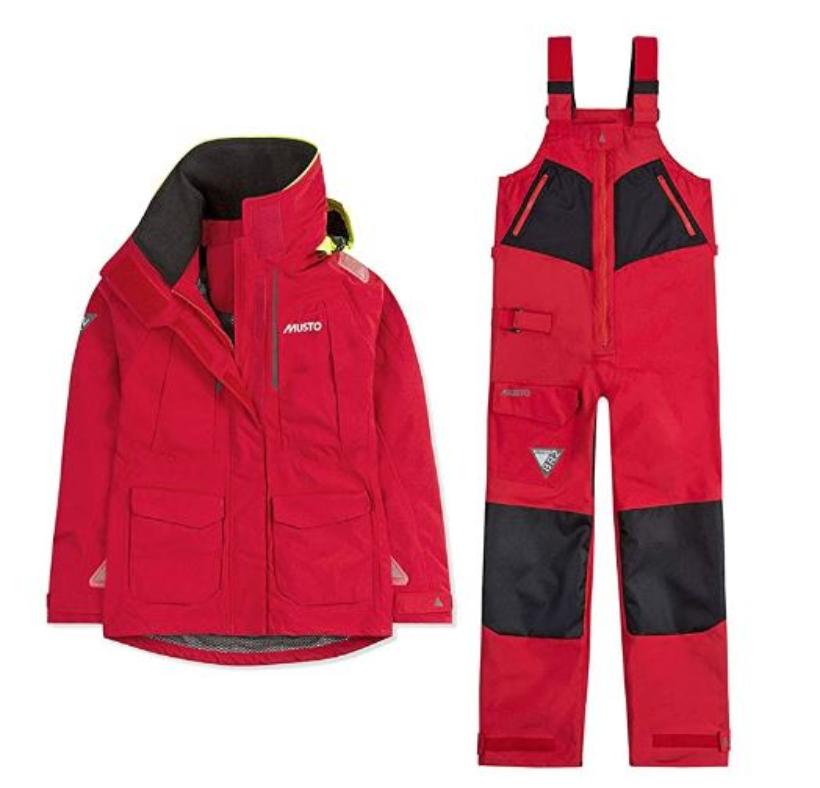

- Sleeping bag: a medium-weight sleeping bag as boats are generally warm inside. Bedlinen are available for each crew but most people prefer to have a sleeping bag in addition.
- Penknife or Leatherman - similar to mountain trips you use them constantly.
- Waterproof covers (phone, camera) if you have one.
- Thermal mug or bidon, ideally with a wide rubber bottom so that it does not slip.
- Guitar or another musical instrument if you play one.
- Wristwatch with seconds precision (essential for long ocean passages with celestial navigation). The best is a simple digital Casio watch with led light that you can buy for 18 Euros or so.
- Electronic equipment of choice (camera, mp3, laptop) with chargers.
- Socket adapters: necessary in some countries.
- Clips for hanging clothes (there are usually some clips on the boat).
- Running equipment if that's your thing.
- Swimsuit for warmer locations.
- Snorkel with mask for warmer locations - sometimes it is on the yacht equipment.
- Swimming shoes for warmer locations to protect feet from sea urchins (e.g. Croatia, Greece).
- Inflatable life jacket: if you have a quality life jacket you should take it.
- Sailing gloves for more grip and protection.
- Travel guides and books.
- A small pillow: can be used in the aeroplane as well.
- Earplugs and sleep mask.
- Pyjamas.
- Pen, pencil and paper (notebook).
- Printed out proformas: details will be sent as part of joining instructions.
Depending on the trip duration you may take less or more clothes. It is unlikely that you will be able to do laundry along the way, although some marinas have them, so bring enough sets of clothes to last you for the whole trip. You can handwash some stuff if necessary but water is at a premium on board so it is generally not encouraged when underway.
The standard equipment of the galley (kitchen) includes full tableware (plates, glasses, cutlery), pots, frying pan, kettle and various additional elements so do not take these.
The best are duffle-style bags or travel frameless backpacks that can be rolled because they are easy to stow. If you take a regular hard suitcase, it might be hard to stow it in the boat especially when all bunks are taken.

You can use packing cubes to keep your kit and clothes divided and organized:
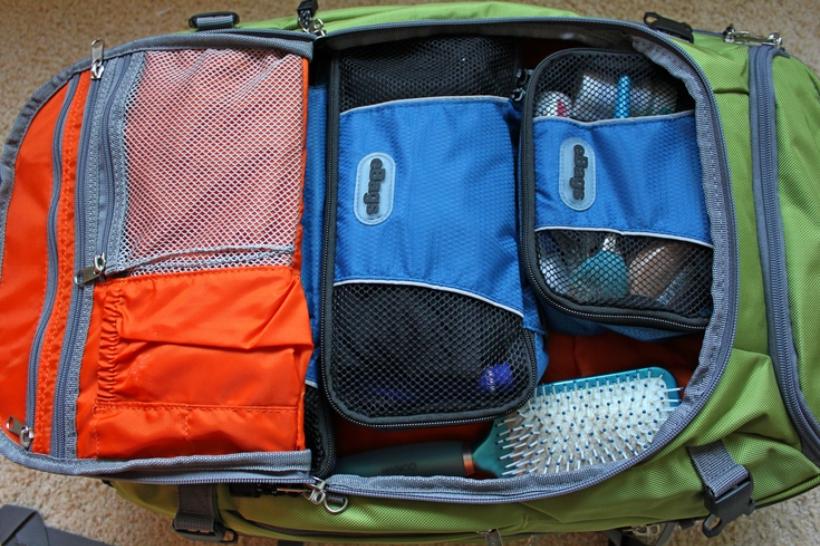
Please note that you cannot take sharp objects such as pocket knives and liquids in containers larger than 100 ml in your hand luggage, they all have to go to the registered baggage. Otherwise, you will have to leave them at the airport.
- All essential equipment needed to safely run a boat (VHF, navigation and safety equipment, etc.)
- Automatic inflatable life jacket, but if you own a quality lifejacket you should take it, e.g. crewsaver, spinlock
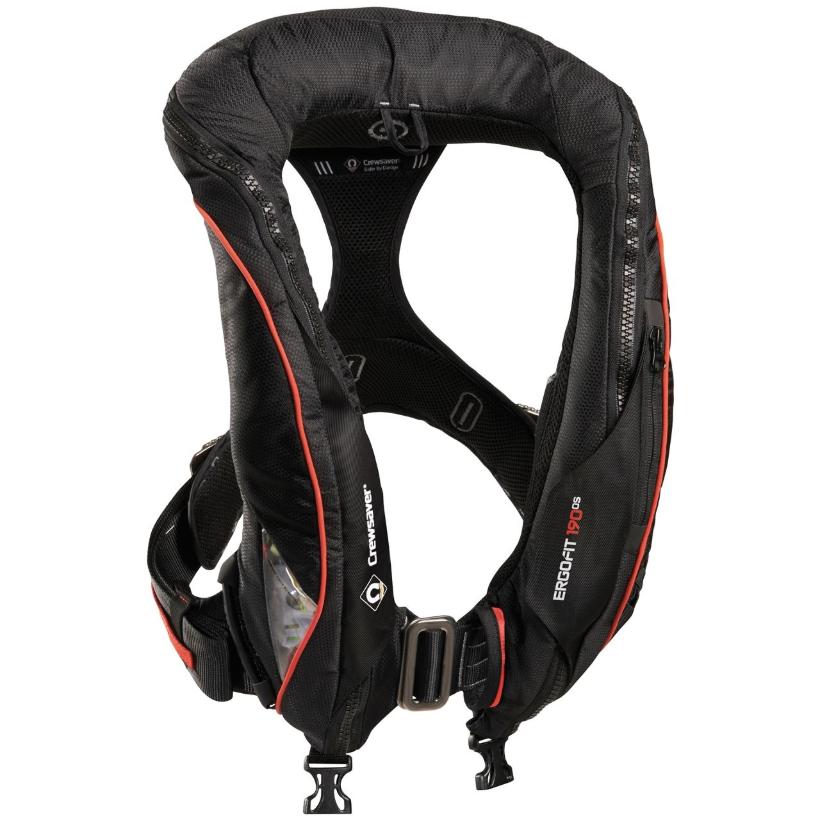
- Tether (Lifeline)

During the entire trip you will sleep on board. There are usually 2-4 cabins on board with double or bunk berths (bunks). You'll stay in one of those cabins. If you come as a couple – you will stay together.
If not all bunks are booked, you might get a single cabin just for yourself. We try to organise watches in a way that "roommates" are not in the same watch so that you can have a longer period with the cabin just for yourself. In any case, your bunk is reserved exclusively for you throughout the entire trip.
There are usually 1-2 bunks in the saloon but we usually don't book them especially if they don't have a lee cloth.
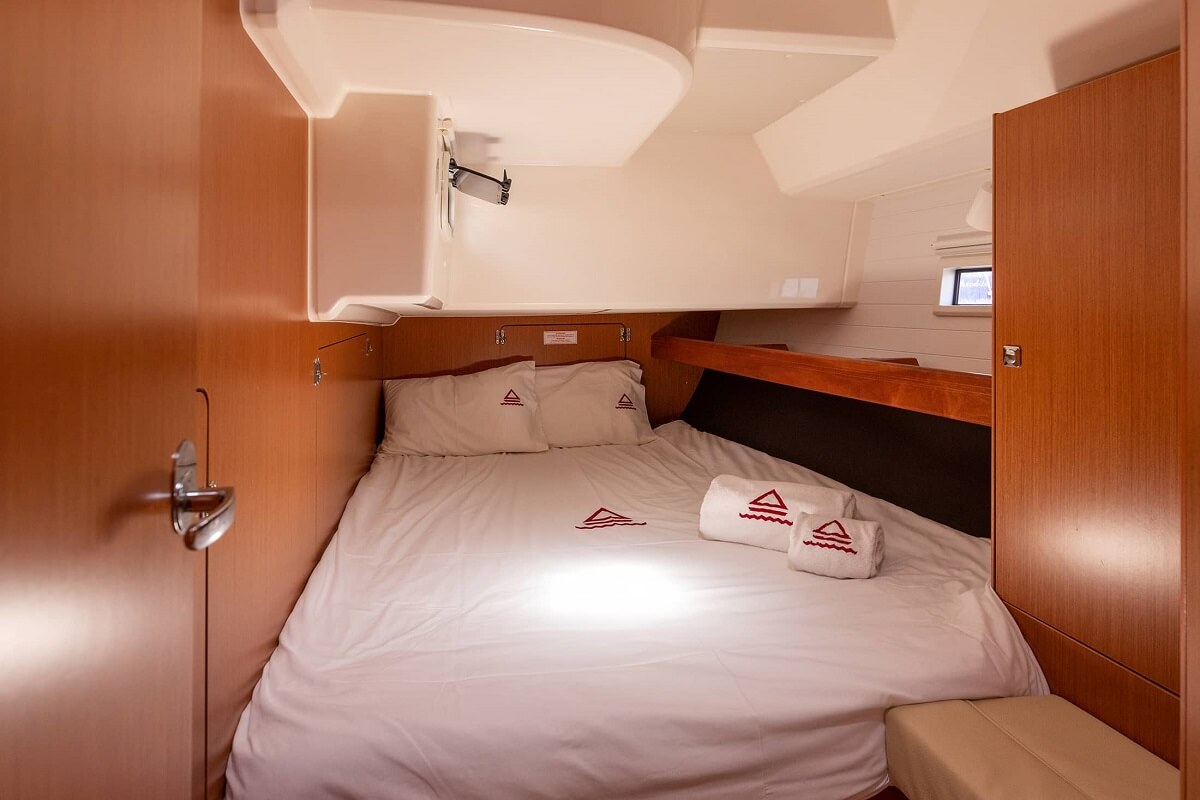
We don't have any hard rules but principles of social behaviour apply so that unnecessary noises are minimized while people are sleeping on board.
In the course of the trips we will sail for several hours a day or more, maintain a watch system and may sail during the night. Therefore, there is no fixed lights-off time and your sleeping rhythm will likely be different than at home.
We try to follow the anticipated routes as stated in the trip description. However, on the sea, we need to remain flexible as we cannot plan and anticipate everything. Therefore, your expectations might be different than what you experience, subject to weather, boat and crew conditions at the time, and what the majority of the crew wants.
While we plan the routes carefully and try to follow them as much as possible during the trip, the amount of ports we visit, and the amount of nautical miles or hours sailed may differ from what is stated in the trip description.
We remove all plastic and cardboard packaging as much as possible and discard it at the dock. Food waste goes overboard when we are at sea over 12 miles offshore in deep water. We store all other rubbish in double trash bags that we can discard when we are in a harbour. We follow the MARPOL convention that states exactly where and what exactly we are allowed to discharge into the sea.
There is no dedicated cook on board so everyone will be expected to contribute to cooking. We have simple recipes prepared for all planned meals so that anyone can handle this. The meals are simple and fast to cook (e.g. salads, spaghetti, scrambled eggs, sandwiches) and should not take under 30 minutes to prepare. But if you are good at cooking, you can of course let your imagination run wild.
We buy food on the joining day based on the menu list and we stock fresh ingredients along the way in harbours if possible.
We cook and eat most of the time on board but whenever we head ashore, we may decide to go to a restaurant together instead of cooking onboard. Anyone who doesn't feel like can stay and eat on board. This is very individual.
On board you will find everything needed, e.g. stove, oven, sink, and table set etc.
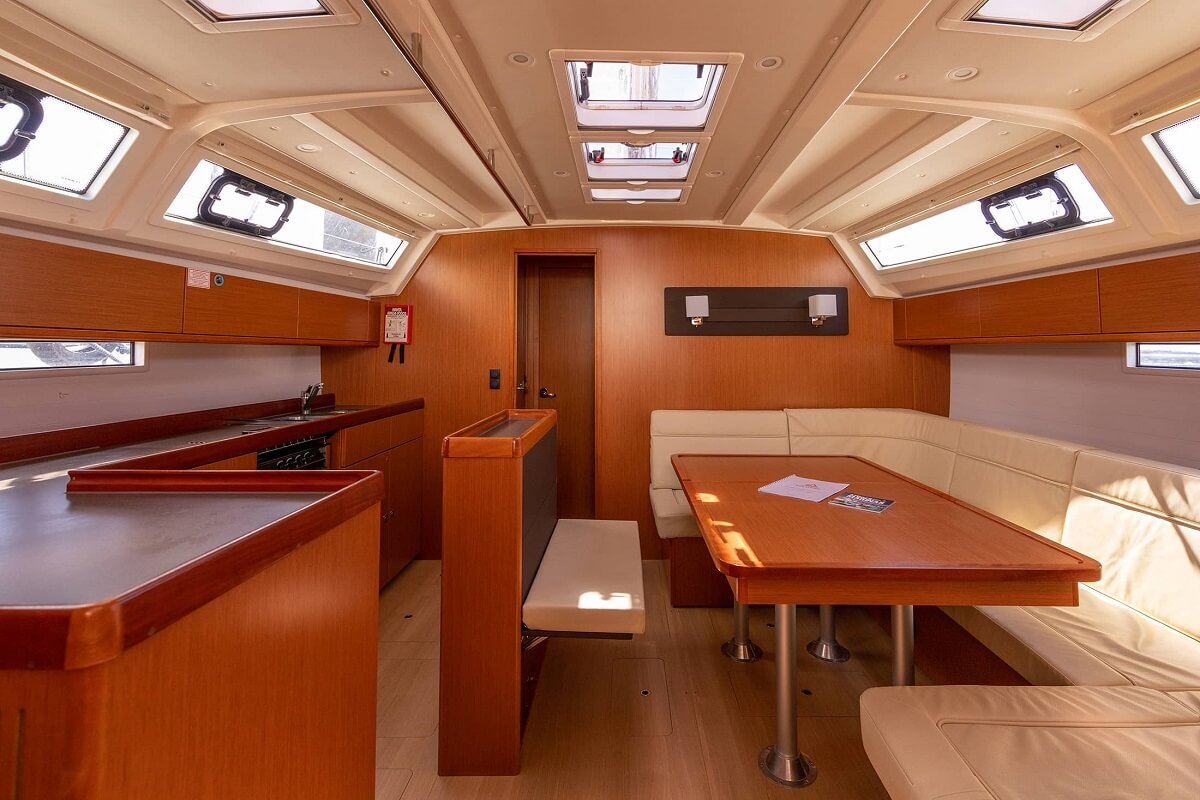
On the yacht, there are always 1 or 2 toilets with hot water where you can take a shower. Marinas usually have facilities of that kind but not always.
We have a lot of water on board but it has limits so during longer passages we are very mindful of how we use water.

For most trips no previous sailing experience or training is required. Just bring good humour and enjoy your sailing holiday. If you are new to the sport, you will learn everything needed on board. If any training or experience is required, it will be stated explicitly in the trip description. If you would like to get prepared better for a trip, have a look at the offer of RYA courses that are run in different countries.
That said, we do require a certain level of physical fitness to join us for an offshore passage.

On average 50% of people that join sailed with us in the past. These are friends, family or cool people met while sailing and travelling. These are non-conflict and open-minded team players.
There is no "profile" of people who participate in such trips. We are looking for easygoing people who get along with others, are respectful and trustworthy, like to sail and are eager to learn & work (participate in running the boat). The crew is always very international and you can experience different cultures. The age range is typically from 18 to 65, but we had also much yunger and much older crew on board. This does not really matter. Some of them might be professional sailors and have lots of experience and others might not have any. We make sure that there are always at least two more experienced sailors in the crew.
Our main language on board is English. If English is not your native language, and you don't know the English sailing terms, don't worry. You will learn the necessary vocabulary in no time while on board. We also compiled dictionaries for some languages with all the essential terminology to get people started. You can find them in the Resources section here.
Yes, in the course of most of the trips we will sail during the night. On coastal and limited offshore trips we try not to sail overnight but we may arrive late at night or start the day early before the sunrise.
Sailing at night is a magical experience. If you have never sailed at night, you will be amazed by the night sky. The stars are so bright and there are so many of them. You will be able to see beautiful sunrises, sunsets, and observe a wonderful reflection of the moon on the sea.
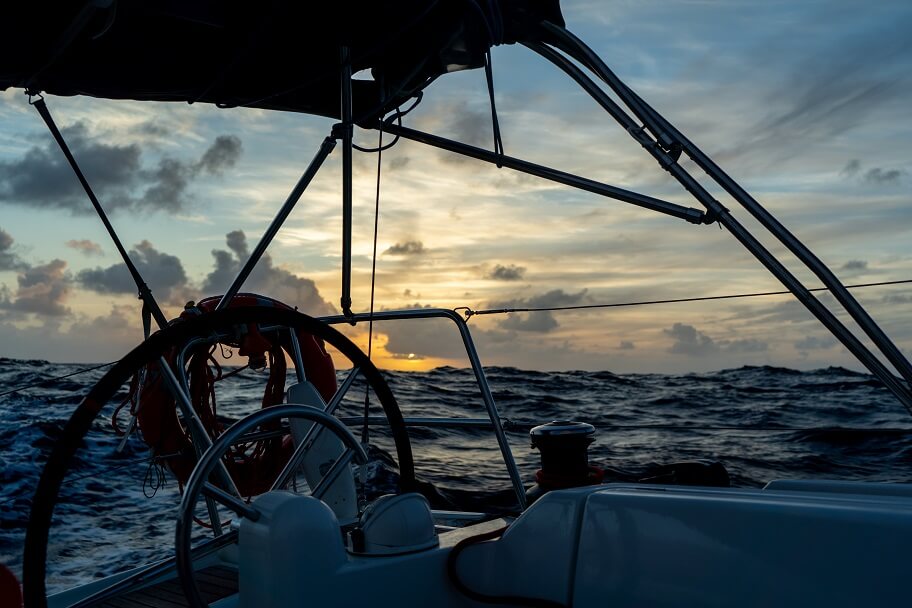
Absolutely. If there are no bunks available on the trip, please book the trip and we will put you on a waiting list. No deposit is required. We will get back to you as soon as a bunk is available.
If you want to stay tuned, please subscribe to our newsletter (bottom of each page).
If you want to stay tuned, please subscribe to our newsletter (bottom of each page). Alternatively, just check our website for any updates.
All expenses including consumables are transparent and explicitly stated in a trip description. The trips are non-commercial and runs in a friends-sailing manner. We don't run a commercial venture. The contribution is to cover expenses for running a boat.
The price per person is fixed even if a trip is not fully booked.
- Non-refundable deposit (50% of the total price) is paid within one week of booking.
- The rest 50% is payable 35 days before the start of the trip.
- Money for consumables (all food consumed onboard, harbour fees and diesel) is collected on the joining day.
All ashore trips and restaurants, travel to and from the boat as well as travel insurance are not included in the trip price.
Yes, it is your responsibility to arrange suitable travel insurance for the period of the trip. This insurance must cover yachting for the area of the trip and should cover personal accidents, medical expenses, evacuation & repatriation, loss and damage to personal effects.
Many insurance companies specialise in maritime travel insurance. Whichever insurance you get, just double check it is regulated by the financial conduct authority of your country. The best consult with your insurance agent.
- In Europe each country is likely to have different options. Allianz is one the most popular.
- For those in Germany, ADAC has the best offer (worldwide medical coverage from 20 Euro per year)
- For those based in the UK, either Topsail or Bishops Skinner are good options for a cheap insurance policy designed specifically for sailing.
- If you're based in Ireland, you can try Topsail Ireland.
- If you are based in the USA, try Gowrie.
Principles of social behaviour apply here which means you do not have to worry about it unless you intentionally break something on the boat (e.g. put out a cigarette on the wooden deck and make a hole because you do not care). In that case, you will have to cover the expenses. That being said this has never been an issue in the past.
Generally, damage expenses are covered by boat and deposit insurance.
If you need to cancel the trip, contact us as soon as possible.
- The initial 50% deposit is non-refundable unless a replacement for you is found.
- The rest 50% of the price is refundable if you cancel the trip more than 35 days before the start of the trip.
- For cancellations within the 35 before embarkation there will be no reimbursement unless a replacement is found for you in which case you will be refunded the total price.
Trips are run regardless of the number of crew signed. In case we have to cancel the trip from our side for any reason (never happened), you will be refunded the total price. Another possibility would be to transfer the booking to another trip.
Please note, however, that you can only be refunded up to the amount you paid. As an example, you will not be refunded for travel and hotel costs in any case.
If you are just starting with sailing read this first:
If you need a refresher, these pocket-size guides are the best:
There are tons of good books that you can read. You can find a more comprehensive list here.
Yes, trips run regardless of the number of participants. It is our responsibility to find the crew and make sure enough participants are joining.
The price per person is fixed even if a trip is not fully booked.